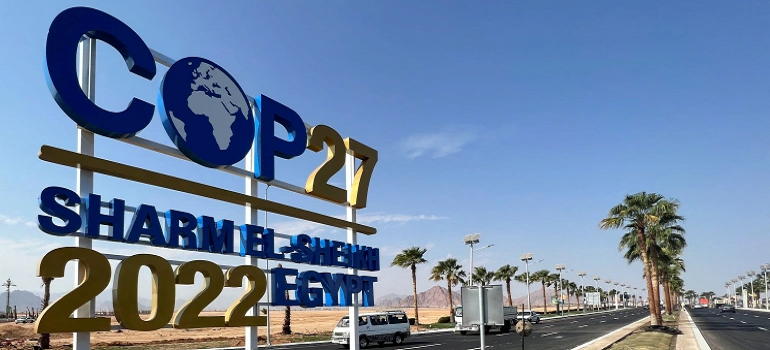Slow progress at COP27 as loss and damage fund hangs in the balance.
Taking place under the shadow of Egypt’s oppressive regime, COP27 has seen the US play a deeply obstructive role yet again, blocking the demands of developing countries at every turn. Indigenous Peoples and frontline communities are already suffering from increasingly extreme weather, causing massive economic losses and cultural erasure. Developing countries continue to fight to establish a fund to pay for this irreversible Loss and Damage, said Friends of the Earth International in a press statement.
Meanwhile, rich countries are positioning themselves as the saviours of the 1.5°C threshold, blaming larger developing countries for lack of climate action. This, despite their own decades of inaction, flagrant disregard for their own historical responsibility, ongoing climate pollution, and previous reluctance to even agree to the 1.5°C threshold that climate justice activists and developing countries demanded for many years.
Sara Shaw (Friends of the Earth International) commented: “The story developed countries will spin in the coming days is that larger developing countries, like China and India, are to blame for any lack of progress in Sharm-el Sheikh. This is not the story of what has happened here. Developed countries, especially the US, are cynically shifting the blame away from their own lack of action on emissions reductions to countries that are less historically responsible for climate change. They are trying to erase equity and historic responsibility.”
“The same rich countries have also failed to put the already inadequate $100 billion per year they owe on the table, and continue to muddy the finance waters by pushing carbon markets, private finance, loans and philanthropy, while the demand is for new and additional grant-based public finance and repayment of the climate debt.”
The battles over language that are raging at COP27 around whether all fossil fuels or just coal are named in the decision text, translate to devastating realities for communities living near fossil fuel and other extractive projects. To curb runaway climate change, we need a rapid and equitable transition away from oil, gas and coal, starting with the developed countries who built their economies on these dirty energies. But the push for the word ‘unabated’ as a qualifier for fossil fuels in the text opens the door to huge loopholes like carbon capture and storage, and fossil-based hydrogen, which will allow emissions to continue.
Rita Uwaka, Friends of the Earth Nigeria, said: “Africa does not need more fossil fuels, especially not gas. Oil has devastated my country, Nigeria. Gas exploitation in Mozambique is displacing communities and stoking conflict. Africa needs a COP27 outcome that calls for rapid, equitable phase out of all fossil fuels, not just coal.”
This year, there have been efforts to push false solutions in negotiations on carbon markets. Hemantha Withanage, Chair of Friends of the Earth International, added: “Thankfully COP27 has delayed moves to put geoengineering, dangerous and untested technologies, and nature-based solutions into carbon offset markets. We remain highly concerned that these will come back next year, giving cover for continued emissions, grabbing of land, forests and water from vulnerable communities, and violations of peoples’ rights. We must be vigilant, and we will keep fighting for human rights and climate action based on equity and justice.”


